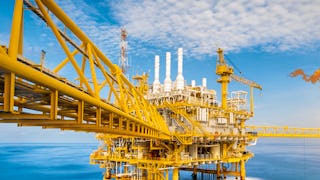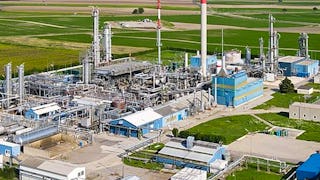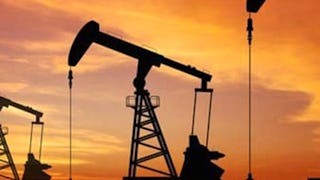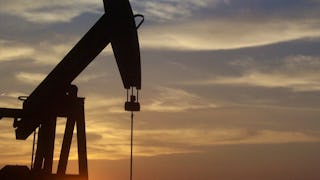The course on "Midstream Oil & Gas Processing" provides a comprehensive understanding of the various processes involved in the midstream Oil & Gas operations such as transportation, separation, stage separation and treatment of recovered oil and gas, as well as the storage of hydrocarbons.

Genießen Sie unbegrenztes Wachstum mit einem Jahr Coursera Plus für 199 $ (regulär 399 $). Jetzt sparen.

From Wellhead to Refinery: Midstream Oil and Gas Processing
Dieser Kurs ist Teil von Spezialisierung für Petroleum Engineering with AI Applications
Unterrichtet in Deutsch (KI-Synchronisation)

Dozent: Subject Matter Expert
3.404 bereits angemeldet
Bei enthalten
(28 Bewertungen)
Empfohlene Erfahrung
Kompetenzen, die Sie erwerben
- Kategorie: Chemical Engineering
- Kategorie: Hydraulics
- Kategorie: Oil and Gas
- Kategorie: Environmental Regulations
- Kategorie: Process Engineering
- Kategorie: Pump Stations
- Kategorie: Water Quality
- Kategorie: Thermal Management
- Kategorie: Production Process
- Kategorie: Three-Phase
- Kategorie: Petroleum Industry
- Kategorie: Equipment Design
- Kategorie: Environmental Engineering
Wichtige Details

Zu Ihrem LinkedIn-Profil hinzufügen
4 Aufgaben
Erfahren Sie, wie Mitarbeiter führender Unternehmen gefragte Kompetenzen erwerben.

Erweitern Sie Ihre Fachkenntnisse
- Lernen Sie neue Konzepte von Branchenexperten
- Gewinnen Sie ein Grundverständnis bestimmter Themen oder Tools
- Erwerben Sie berufsrelevante Kompetenzen durch praktische Projekte
- Erwerben Sie ein Berufszertifikat zur Vorlage

In diesem Kurs gibt es 4 Module
The module on "Transportation and Gathering Station" provides a complete understanding of the processes and technologies involved in gathering and transporting oil and gas from the field. The module begins with an introduction to gathering stations, highlighting their role in collecting and transporting hydrocarbons from various wells. This module delves into the principles of flow in pipes, pipeline specifications and the automation of pipelines using SCADA systems. Learners will gain insights into different types of measurements used in the oil and gas field, including flow rate, pressure and temperature measurements. The module covers types of pumps, compressors and booster stations used for fluid transportation, along with their applications and operational considerations. Learners will also understand fluid dynamics and flow patterns of oil and gas mixtures, as well as the impact of non-isothermal flow on pumping operations. Furthermore, the module explores the transportation of heavy oil, addressing the challenges and specialized techniques involved in moving viscous oil. Learners will study corrosion monitoring and control, as well as wax deposition and prevention methods to ensure the integrity and efficiency of the transportation system. Also, artificial lift methods are discussed, providing learners with an understanding of the techniques employed to enhance production from wells with declining reservoir pressure.
Das ist alles enthalten
13 Videos1 Aufgabe
The module on "Separation Systems" provides an insight into the principles and processes involved in separating oil and gas in production facilities. The module begins with an introduction to separation in oil and gas production, highlighting the importance of effective separation for maximizing recovery. It explores surface production/separation facilities, gaining an overview of their schematic and functionality, factors impacting recovery in separators and understanding of the basic equilibrium relations for complex mixtures. The module covers the key components of test separators and group separators, including slug catchers. Learners will gain insights into the functionality and design considerations of these separators for efficient separation. It delves into two-phase separation, focusing on the functional components and types of separators used in the industry. Learners will understand the design theories behind two-phase separators, including sizing and operational parameters. By the end of the module, learners will have a solid understanding of separation systems in oil and gas production. They will be equipped with knowledge of surface production/separation facilities, equilibrium relations, test separators, group separators, slug catchers, and the design principles of two-phase separators. This knowledge will enable them to analyze and optimize separation processes, ensuring effective recovery of oil and gas resources.
Das ist alles enthalten
9 Videos1 Aufgabe
The module on "Stage Separation and 3-Phase Separators" provides a comprehensive understanding of the principles and applications of stage separation and the design and operation of 3-phase separation systems. The module begins by introducing the concept of stage separation and its relevance in the oil and gas industry. It explores the applicability of stage separation, its advantages and limitations in optimizing production and recovery. The design theory of 3-phase separation systems is extensively discussed covering sizing of separators, considering factors such as flow rates, fluid properties and separation efficiencies. Additionally, the module explores current technological trends and advances in separations giving insights into innovative separation techniques, emerging equipment and industry practices. By the end of the module, learners will have a solid understanding of stage separation and 3-phase separation systems. They will be equipped with the knowledge to evaluate the applicability of stage separation, design and operate 3-phase separation equipment and stay updated with the latest technological advancements in separations.
Das ist alles enthalten
7 Videos1 Aufgabe
The module on "Treatment of Recovered Oil and Storage" provides a comprehensive understanding of the processes and equipment involved in treating and storing recovered oil. The module begins with an introduction to crude oil treating systems, emphasizing their importance in ensuring the quality and stability of crude oil. It explores heat transfer equipment used in oil and gas treatment, including horizontal and vertical heater treaters, giving insights into the principles and applications of heat transfer in various treatment processes. The module covers electrostatic heater treaters and oil dehydrators, addressing their functionality and significance in removing impurities and water from the oil. It also covers emulsion treating and demulsification techniques to optimize oil quality. Treatment methods such as oil de-salting systems and caustic wash are extensively discussed, providing an understanding of their role in removing contaminants from the crude oil. Crude stabilization, including types of stabilizers, equipment details and process schemes is also explored. It also investigates produced water treatment methods and the equipment used in water injection system treatment and sand management. The module concludes with a focus on storage and vapor recovery. Learners will gain knowledge about onshore and offshore hydrocarbon storage facilities and understand the principles and design considerations for vapor recovery from field production and storage tanks.
Das ist alles enthalten
13 Videos1 Aufgabe
Erwerben Sie ein Karrierezertifikat.
Fügen Sie dieses Zeugnis Ihrem LinkedIn-Profil, Lebenslauf oder CV hinzu. Teilen Sie sie in Social Media und in Ihrer Leistungsbeurteilung.
Dozent

von
Mehr von Mechanical Engineering entdecken
 Status: Kostenloser Testzeitraum
Status: Kostenloser Testzeitraum Status: Kostenloser Testzeitraum
Status: Kostenloser TestzeitraumL&T EduTech
 Status: Kostenloser Testzeitraum
Status: Kostenloser TestzeitraumL&T EduTech
 Status: Vorschau
Status: VorschauDuke University
Warum entscheiden sich Menschen für Coursera für ihre Karriere?




Bewertungen von Lernenden
28 Bewertungen
- 5 stars
78,57 %
- 4 stars
7,14 %
- 3 stars
7,14 %
- 2 stars
3,57 %
- 1 star
3,57 %
Zeigt 3 von 28 an
Geprüft am 27. Dez. 2024
Provides over view of the various process, equipment etc in simple comprehensive manner
Geprüft am 14. Sep. 2025
A very detailed information about the oil & gas processes.

Neue Karrieremöglichkeiten mit Coursera Plus
Unbegrenzter Zugang zu 10,000+ Weltklasse-Kursen, praktischen Projekten und berufsqualifizierenden Zertifikatsprogrammen - alles in Ihrem Abonnement enthalten
Bringen Sie Ihre Karriere mit einem Online-Abschluss voran.
Erwerben Sie einen Abschluss von erstklassigen Universitäten – 100 % online
Schließen Sie sich mehr als 3.400 Unternehmen in aller Welt an, die sich für Coursera for Business entschieden haben.
Schulen Sie Ihre Mitarbeiter*innen, um sich in der digitalen Wirtschaft zu behaupten.
Häufig gestellte Fragen
To access the course materials, assignments and to earn a Certificate, you will need to purchase the Certificate experience when you enroll in a course. You can try a Free Trial instead, or apply for Financial Aid. The course may offer 'Full Course, No Certificate' instead. This option lets you see all course materials, submit required assessments, and get a final grade. This also means that you will not be able to purchase a Certificate experience.
When you enroll in the course, you get access to all of the courses in the Specialization, and you earn a certificate when you complete the work. Your electronic Certificate will be added to your Accomplishments page - from there, you can print your Certificate or add it to your LinkedIn profile.
Yes. In select learning programs, you can apply for financial aid or a scholarship if you can’t afford the enrollment fee. If fin aid or scholarship is available for your learning program selection, you’ll find a link to apply on the description page.
Weitere Fragen
Finanzielle Unterstützung verfügbar,

